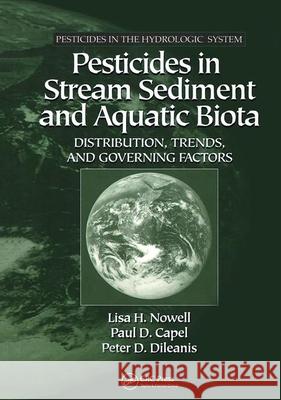Pesticides in Stream Sediment and Aquatic Biota: Distribution, Trends, and Governing Factors » książka
Pesticides in Stream Sediment and Aquatic Biota: Distribution, Trends, and Governing Factors
ISBN-13: 9781566704694 / Angielski / Twarda / 1999 / 1040 str.
Pesticides in Stream Sediment and Aquatic Biota: Distribution, Trends, and Governing Factors
ISBN-13: 9781566704694 / Angielski / Twarda / 1999 / 1040 str.
(netto: 1166,13 VAT: 5%)
Najniższa cena z 30 dni: 1208,97
ok. 16-18 dni roboczych.
Darmowa dostawa!
More than 20 years after the ban of DDT and other organochlorine pesticides, pesticides continue to be detected in air, rain, soil, surface water, bed sediment, and aquatic and terrestrial biota throughout the world. Recent research suggests that low levels of some of these pesticides may have the potential to affect the development, reproduction, and behavior of fish and wildlife, and possibly humans.
Pesticides in Stream Sediment and Aquatic Biota: Distribution, Trends, and Governing Factors assesses the occurrence and behavior of pesticides in bed sediment and aquatic biota-the two major compartments of the hydrologic system where organochlorine pesticides are most likely to accumulate. This book collects, for the first time, results from several hundred monitoring studies and field experiments, ranging in scope from individual sites to the entire nation. Comprehensive tables provide concise summaries of study locations, pesticides analyzed, and study outcomes.
Comprehensive and extensively illustrated, Pesticides in Stream Sediment and Aquatic Biota: Distribution, Trends, and Governing Factors evaluates the sources, environmental fate, geographic distribution, and long-term trends of pesticides in bed sediment and aquatic biota. The book focuses on organochlorine pesticides, but also assesses the potential for currently used pesticides to be found in bed sediment and aquatic biota. Topics covered in depth include the effect of land use on pesticide occurrence, mechanisms of pesticide uptake and accumulation by aquatic biota, and the environmental significance of observed levels of pesticides in stream sediment and aquatic biota.











